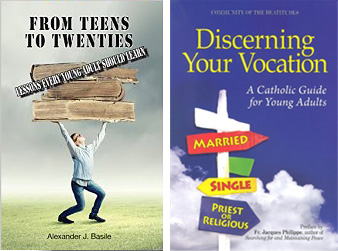 “From Teens to Twenties: Lessons Every Young Adult Should Learn”
“From Teens to Twenties: Lessons Every Young Adult Should Learn”
by Alexander J. Basile.
Paulist Press (Staten Island, New York, 2014).
118 pp., $8.95.
“Discerning Your Vocation: A Catholic Guide for Young Adults”
by Father Nathanael Pujos, Father Anthony Ariniello and Sister Emmanuelle Borchardt of the Community of the Beatitudes.
Paulist Press (Staten Island, New York, 2014).
84 pp., $6.95.
Human development is an interesting field of study. Over the last 100 years a variety of social sciences have explored what are developmentally appropriate tasks for each stage of life. A great deal of study has gone into trying to understand the development that takes place during adolescence, the period that runs roughly through the teen years but may begin earlier and often continues into the early 20s.
The two books considered in this review also address these adolescent years but from a religious development perspective. While they come from the same publisher and are aimed at the same audience, their approaches are very different. Both offer ideas that would be beneficial to the teens to which the books are addressed, but only one of the books offers these ideas in a teen-friendly way.
“From Teens to Twenties” offers 28 lessons that the author, Alexander J. Basile, feels that teens should learn. Basile chairs the religion department at Kellenberg Memorial High School in Uniondale, New York. The lessons would generally be considered standard fare for adolescent development, such as Lesson 21, “Unplug and listen for the silence,” or Lesson 25, “Money never guarantees anything.”
The ideas presented are reasonable and of substance, and generally would be valuable information for teens to learn. The concern is that the lessons are offered as advice. The rule of thumb when working with adolescents is to help them to discover the truths of life (and faith) for themselves with the guidance of the faith community.
[hotblock]
To be clear, this does not mean that teens determine what is true for them, but that they discover the truth held by their faith communities. While the tone of the writing is not preachy, it certainly does a lot of telling teens what they should know, do and understand. While the intended audience for the book is clearly teens themselves, adults who work with teens might be the more likely readers.
“Discerning Your Vocation” addresses many of the same life and faith lessons found in “From Teens to Twenties,” but presents them from the perspective of discernment: when stuff happens in life what steps can you take to understand what it means and how it will affect your life. Instead of telling teens what they should feel or think, “Discerning Your Vocation” offers a process that young people can use to make sense of events, along with their thoughts and feelings, and see if they can find, through this process, their own vocational call.
The intended audience for “Discerning Your Vocation” is, according the preface, “students and young adults who are in search of God’s will.” If someone is searching for clarity in their vocational call, this short book by young men and a woman who have recently made the decision to enter a religious community could be of great value. The questions asked and the guidance offered seems appropriate for the age group and for the questions at hand. The advice is not overly pious, and does not presume that the reader occupies a particular theological place or understanding.
Youth leaders and parents of teens are encouraged to read these books themselves to see if they are worth passing on to their young people. You are the ones who know and understand their needs and what they will find of interest.
***
Mulhall is a catechist. He lives in Laurel, Maryland.
PREVIOUS: Movie review — Mad Max: Fury Road
NEXT: ‘Pitch Perfect 2:’ Catchy songs but a tin ear for dialogue


Share this story